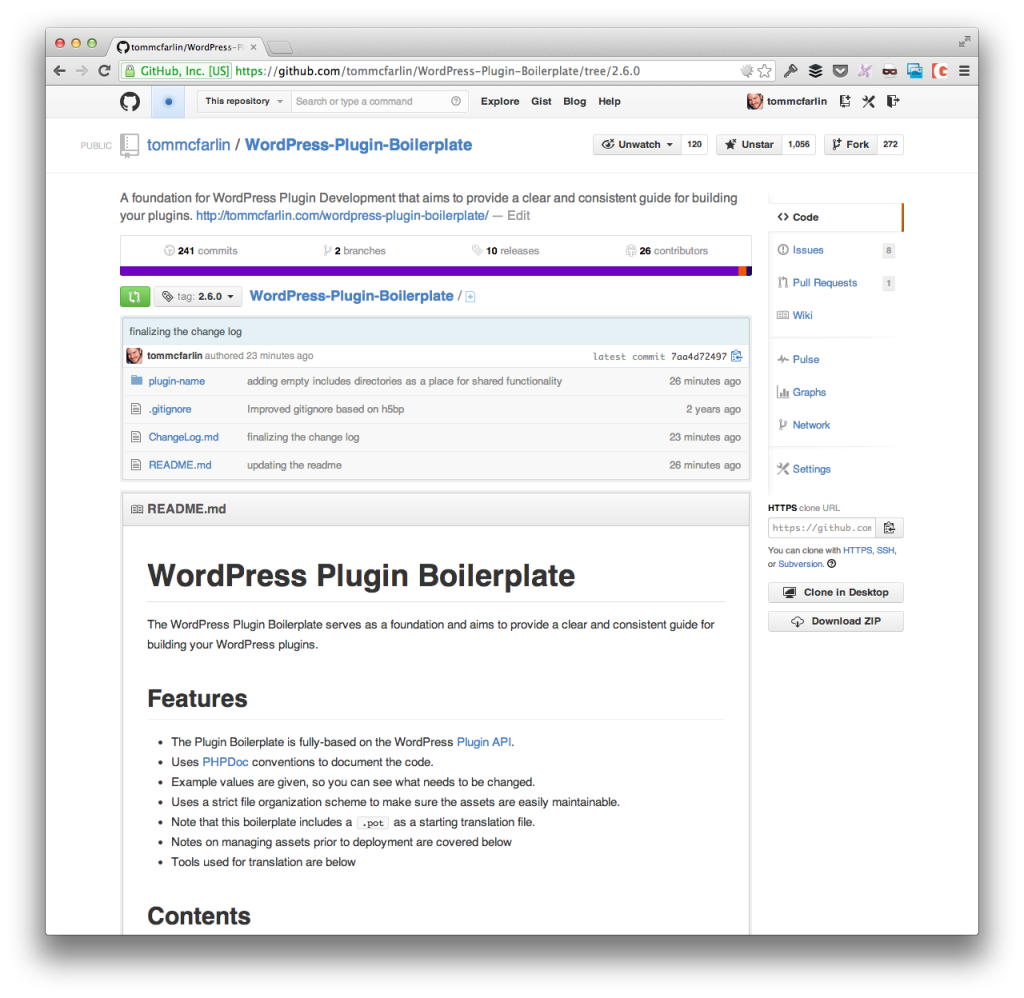Today, I am absolutely stoked to announce the next major release of the WordPress Plugin Boilerplate.
I discussed some of the things I’ve learned – and some of the changes that have been implemented in a recent post – but I couldn’t be happier with this release.
Some quick statistics:
- The last official release was on May 17, 2013. We had one minor release in July that I opted to fold into this release and officially tag as `2.6.0`.
- We’re now working to implement semantic versioning into the Boilerplate.
- The milestone for `2.7.0` is already being planned.
- The project now includes 241 commits and 10 contributors
This is by far the largest commit and set of changes that have gone into the Boilerplate since it has been released. You can grab it here, but read on for more details!
The WordPress Plugin Boilerplate 2.6.0

The WordPress Plugin Boilerplate 2.6.0
You can read the `ChangeLog` in its entirety; however, there are a number of notable changes that have come with this particular version of the Boilerplate that are both exciting and important to share, especially for those of you who have been working with the project for the past couple of years.
1. Separate Directories
We’re not at a place where we can use namespaces within the context of our plugins; however, we’ve restructured the plugin so that it should be easier to get up and running not only with WordPress’ plugin subversion repository, but also as it relates to organizing your code:
- There is now an `admin` directory for dashboard-specific functionality
- There is now a `public` directory for pubic-facing functionality
- There is a top-level `includes` directory where shared classes and libraries may reside
All files that reside in the top-level `assets` directory belong the Subversion repository’s `assets` directory (all of which is covered in the `README`).
2. Recommendation Localization Tools
One of the challenges of working with internationalizing your plugins is knowing how best to structure the base localization file for other tools, and for your plugin itself.
To that end, the contributors have come together to provide a set of recommended tools all of which will play nicely with WordPress, the Boilerplate, and now your plugin.
Again, you can find this information in the `README`.
3. Support For The GitHub Updater
As GitHub continues to gain popularity among developers – WordPress included – we’ve introduced support for the GitHub Updater plugin so that you can easily hook up your plugin to its GitHub repository so users will be notified when there’s an update when you push to its respective GitHub repository.
4. And Much More
This isn’t all – there is a lot to checkout between the `ChangeLog`, the restructuring of the plugin, and the documentation that is provided throughout each attribute, function, and class in the Boilerplate.
Thanks To All!
This version would not have been possible were it not for the generosity of people who offered their time and talents on hopping in on discussions, offering pull requests, and debating some of the best ways to handle situations for those who are using this as a starting point for their plugin development efforts.
In no way can I take credit full for this project as we’ve got quite a handful of awesome people now working on it. If you’re interested, feel free to jump in and start working with us.
Now, on to `2.7.0`.



Leave a Reply
You must be logged in to post a comment.